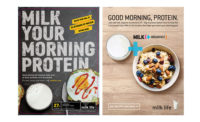Lapping it up
4 opportunities for dairy processors to develop new milk products and to increase sales
Tetra Pak titles its four trends Indulgence, Personalized Products, Designer Dairy and The Natural Choice.

Illustration by Tetra Pak
If consumers know that milk is good for them, then why aren’t they drinking it? The answer in part lies in the packaging. Milk “has not sufficiently evolved to meet the modern lifestyle,” according to a report from a supplier of packaging and processing equipment for the dairy industry. The gallon jug of milk is irrelevant to the 10% of Americans not eating breakfast and 73% of consumers worldwide who snack outside of mealtimes, sometimes replacing the meal itself.
The average age when consumers give up milk is 28. They said they did so for no particular reason (27%) or that they no longer like the taste (26%). They would come back to the category if milk contained more calcium and protein, if it were “all natural,” was digestible and came in new flavors and with a different smell.
These are some results of a survey by Tetra Pak showing that among consumers in the developed and developing nations, 43% associate milk with healthy benefits. In China, 70% see milk as nutritious. And when consumers worldwide were asked if they could think of any disadvantages to milk, 61% overall said no, even though they are aware of debates about milk’s suitability in the diet.
Tetra Pak, based in Switzerland, today released a report titled “Revitalizing Dairy, the new good of milk.” The study is its eighth annual analysis of issues facing dairy processors worldwide.
To bring more consumers back to milk, and to keep them drinking the beverage, Tetra Pak identified four trends for dairy processors to address. It labeled these Indulgence, Personalized Products, Designer Dairy and The Natural Choice.
Developing indulgent milk products let adults and children “pamper” themselves with a nutritious food. These so-called “permissible” treats made from milk play off of milk’s inherent creamy mouthfeel and taste.
Dairies have been successful with personalized products, according to Tetra Pak. These fill consumer demands for low-fat or lactose-free milks. These so-called Milk 2.0 products can command a premium price.
Related to the personalized trend is the “designer dairy” trend. Tetra Pak sees an opportunity for protein-enhanced meal replacement products that traditional snacks cannot satisfy. Designer milks are marketed to specific consumer segments.
The “natural choice” trend is reflected in calls for foods without genetically modified organisms or organic foods and beverages.
In his introduction to the analysis, Tetra Pak President and CEO Dennis Jönsson writes that “the key to energizing dairy in all markets is to make consumers excited by milk; to show that it is convenient, pleasure, a special treat even, and relevant to all.”
Looking for a reprint of this article?
From high-res PDFs to custom plaques, order your copy today!







